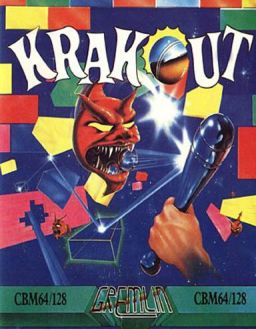
Krakout is a Breakout clone that was released for the ZX Spectrum, Amstrad CPC, BBC Micro, Commodore 64, Thomson computers and MSX platforms in 1987. One of the wave of enhanced Breakout variants to emerge in the wake of Arkanoid, its key distinctions are that gameplay is horizontal in layout, and that it allows the player to select the acceleration characteristics of the bat before playing. It was written by Andy Green and Rob Toone and published by Gremlin Graphics. The music was composed by Ben Daglish.

Sanxion is a horizontally scrolling shooter developed by Stavros Fasoulas for the Commodore 64 and published in 1986 by Thalamus Ltd. It was the first game released by Thalamus. A ZX Spectrum port followed in 1989. Fasoulas also wrote Delta and Quedex.
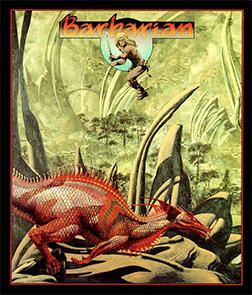
Barbarian is a 1987 platform game by Psygnosis. It was first developed for the Atari ST, and was ported to the Amiga, Commodore 64, MS-DOS, MSX, Amstrad CPC, and ZX Spectrum. The Amiga port was released in 1987; the others were released in 1988. The cover artwork is by fantasy artist Roger Dean.

Cobra is a 1986 platform game based on the film of the same name. It was developed and published by Ocean Software, and was released in Europe for Amstrad CPC, Commodore 64 (C64), and ZX Spectrum. By 1990, it received a budget re-release.

Short Circuit is a video game based on the 1986 film of the same name. It was developed and published by British company Ocean Software, and was released in Europe in 1987, for Amstrad CPC, Commodore 64 (C64), and ZX Spectrum. It was published again in 1989 as a budget re-release.

Yogi's Great Escape is a 1990 platform game based on the 1987 movie of the same name. It was developed by British studio PAL Developments and published by Hi-Tec Software as a budget game. It was released in Europe for Amiga, Amstrad CPC, Atari ST, Commodore 64, Atari 8bit and ZX Spectrum.
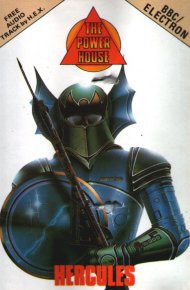
Hercules is a platform video game written by Steve Bak for the Commodore 64 and published by Interdisc in 1984. It was reissued in 1986 by Alpha Omega and ported to the Acorn Electron, BBC Micro, Commodore 16, Plus/4, and ZX Spectrum. Alpha Omega changed its name to The Power House shortly after publishing the game.

The Real Ghostbusters is a 1987 shoot 'em up arcade game developed and published by Data East in the United States. It is loosely based on the animated series of the same name. In Japan, Data East released it as a non-Ghostbusters arcade game under the title Meikyuu Hunter G. In 1989, Activision published The Real Ghostbusters for Amiga, Amstrad CPC, Atari ST, Commodore 64, and ZX Spectrum.
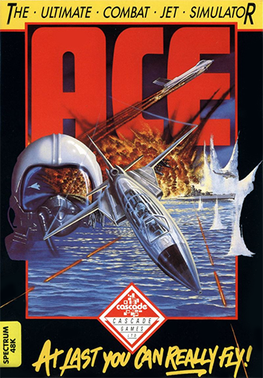
Ace is a combat flight simulator video game published for the Commodore 64, VIC-20, and Plus/4 in 1985 by Cascade Games. It was ported to the Amstrad CPC, Amstrad PCW, Amiga, and ZX Spectrum.
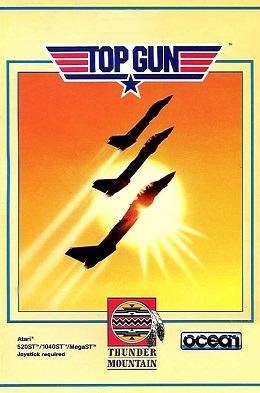
Top Gun is a 1986 combat flight simulation game based on the film of the same name. It was developed and published by British company Ocean Software, and was released for several computer platforms. In the United Kingdom, it was released for Amstrad CPC, Commodore 64, and ZX Spectrum in December 1986. The following year, it was released for Atari ST. In the United States, it was published by Thunder Mountain. In 1989, it was published by The Hit Squad as a budget re-release for ZX Spectrum and Commodore 64.
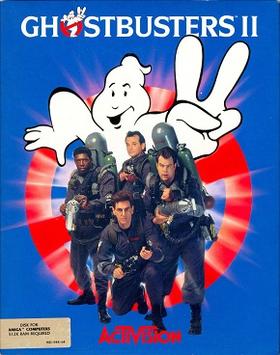
Ghostbusters II is a 1989 action game based on the film of the same name. It was published by Activision for various computer platforms. British studio Foursfield developed a version for Commodore 64, Amiga, Atari ST, Amstrad CPC and ZX Spectrum, which also got ported to the MSX by New Frontier. It features three levels based on scenes from the film. Dynamix developed a separate version for the DOS, also based on the film. The non-DOS versions were praised for the graphics and audio, but criticized for long loading times, disk swapping, and the final level. The DOS, Commodore 64 and Amiga versions were the only versions released in North America.
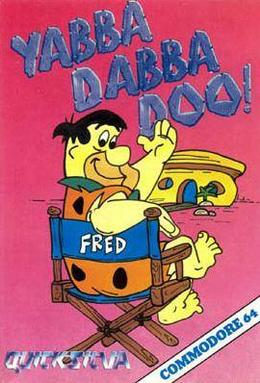
Yabba Dabba Doo! is a 1986 video game developed by British studio Taskset and published by Quicksilva for the Amstrad CPC, Commodore 64 (C64), and ZX Spectrum. It is based on the television series The Flintstones and is the first Flintstones video game.
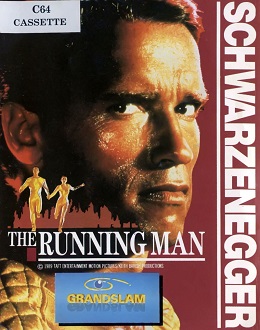
The Running Man is a 1989 beat 'em up video game based on the 1987 film of the same name. It was developed by Emerald Software and published by Grandslam Entertainments for Amiga, Amstrad CPC, Atari ST, Commodore 64, and ZX Spectrum.

Terminator 2: Judgment Day is a 1991 action video game developed by Dementia and published by Ocean Software. It is based on the 1991 film of the same name, and was released in Europe for Amiga, Amstrad CPC, Atari ST, Commodore 64, DOS, and ZX Spectrum. It is a sequel to The Terminator, itself based on the 1984 film of the same name. The game features several gameplay styles such as driving, fighting, and puzzle-solving.

Judge Dredd is a 1990 platform shoot 'em up video game based on the character of the same name. It was developed by Random Access and published by Virgin Mastertronic. It was released in Europe in 1990, for the Amiga, Atari ST, Commodore 64, and ZX Spectrum. Critics found the gameplay repetitive.
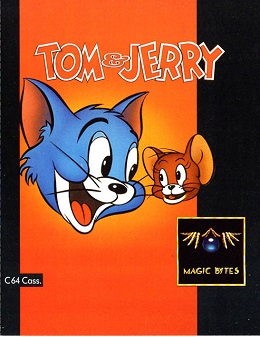
Tom & Jerry is a 1989 platform game developed and published by German company Magic Bytes. It is the first video game based on the cartoon of the same name, and was released in the United States and Europe, for Amiga, Atari ST, and Commodore 64 computers.
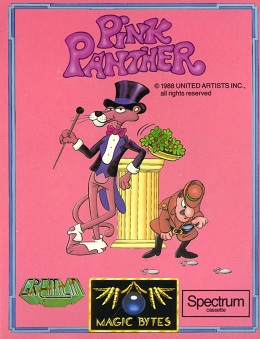
Pink Panther is a 1988 video game based on the character of the same name. It was developed by German company Magic Bytes and published by Gremlin Graphics. It was released in Europe for Amiga, Amstrad CPC, Atari ST, Commodore 64, and ZX Spectrum. Pink Panther was criticized for its control and difficulty, although the Amiga and Atari ST versions received praise for their graphics.

Red Heat is a beat 'em up video game based on the 1988 film of the same name. It was developed by British studio Special FX and published by Ocean Software. It was released in Europe in 1989, for Amiga, Amstrad CPC, Atari ST, Commodore 64 (C64), and ZX Spectrum.

Yogi Bear is a 1987 arcade adventure video game developed by British studio Dalali and published by Piranha Software. It was released in Europe for Amstrad CPC, Commodore 64 (C64), and ZX Spectrum. In the game, Yogi Bear sets out to rescue Boo-Boo after he is captured by a hunter. Yogi Bear received praise for its graphics, but criticism for its controls.

Yes, Prime Minister is a 1987 adventure game based on the television series of the same name. It was developed by Oxford Digital Enterprises and published by Mosaic Publishing. It was released in Europe for Amstrad CPC, BBC Micro, Commodore 64, DOS, and ZX Spectrum. Critics found it a faithful adaptation of the television series, but remarked on its high price, short length, and lack of long-term appeal.




















